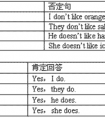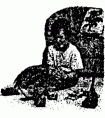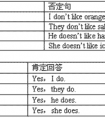Chooseandcorrect. 选出错误的一项,并在横线上改正过来。1.Iwillsendthreepostcard.A B C2.Doyouknowwherethepostofficeare?AB C3.Iwanttosendthise-mailformydadand-五年级英语
辅母 + y 在词尾,把 y 变 i 再加 -es;
词尾字母若是 o,常用三个已足够,要加 -es 请记好,hero, tomato, potato。
(二) 不规则变化
男人女人 a 变 e,鹅足牙 oo 变 ee;
老鼠虱婆也好记,ous 变 ic;
孩子加上 ren,鱼鹿绵羊不用变。
【解说】
1. 英语名词有单数和复数的区别,单数表示“一”,复数表示“多于一。”
名词由单数变复数,多数是规则的变,直接加 -s,例如:book → books, girl → girls。但以 -s, -z, -x, -ch, -sh 结尾的名词,变成复数时加 -es,
例如:bus → buses, buzz → buzzes, box → boxes, watch → watches, brush → brushes
2. -f(e) 结尾的名词单数变复数歌诀:
① 树叶半数自已黄,妻子拿刀去割粮,架后窜出一只狼,就像强盗逃命忙。
② 妻子持刀去宰狼,小偷吓得发了慌,躲在架后保己命,半片树叶遮目光。
例如:leaf (树叶,叶子),half (一半),self (自已),wife (妻子),knife (刀子),shelf (架子),wolf (狼), thief (窃贼,强盗) 和 life (生命),
这些名词变成复数时,都要改 -f (e) 为 v,再加 -es。
3. -f 结尾的名词直接加 -s 变复数歌诀:海湾边、屋顶上,首领奴仆两相望;谁说他们无信仰,证据写在手帕上。
例如:gulf, roof, chief, serf, belief, proof, handkerchief,这些名词变复数直接加 -s。
注:scarf(围巾;披风) 可以先改 f 为 ve 再加-s,也可直接加 -s。
4. 辅音字母 + y 结尾的名词,把 y 变 i 加 -es。
例如:baby → babies, country → countries, family → families;而 -y 前是元音时,-y 不变,直接加 -s。例如:day → days, boy → boys
5. 以 -o 结尾的名词变复数时,多数直接加 -s。
例如:radio → radios, piano → pianos, kangaroo → kangaroos;有的须加 -es,中学课本中有几个这样的单词,可以通过一句口诀来记忆:黑人英雄爱吃西红柿和土豆。
即:Negro → Negroes, hero → heroes, tomato → tomatoes, potato → potatoes;有的以 o 结尾的名词既可加 -s 也可加 -es。
例如:volcano (火山) → volcanos / volcanoes 等。
6. 名词复数的不规则变化需要特别记忆。
例如:man → men, woman → women, goose → geese, foot → feet, tooth → teeth, mouse → mice, louse (虱子) → lice, child → children, fish → fish, deer (鹿) → deer, sheep → sheep 等。
7. 初中课本中表示“某国人”的名词复数形式变化可通过歌诀记忆:中日不变英法变,其余 -s 加后面。
例如:Chinese → Chinese, Japanese → Japanese;
Englishman → Englishmen, Englishwoman → Englishwomen, Frenchman → Frenchmen, Frenchwoman → Frenchwomen;
American → Americans, Rusian → Rusians, Arab → Arabs, German → Germans 等。
8. 不可数名词一般只有单数形式,没有复数形式。有些不可数名词可借助单位词表示一定的数量。
例如:a cup of tea 一杯茶
, two piece of paper 两张纸, an item of news 一则新闻
考点名称:介词
- 介词:
是用来表示它后面的名词(代词)或起名词作用的短语、从句与句中其他成分之间的关系。
介词是英语中很活跃的词,一般置于名词之前。它常和名词或名词性词语构成介词短语。
同一个介词常和不同的词语搭配形成固定搭配,表示不同意义。 介词分类:
一、表示地点位置的介词
(1)at, in, on, to, for
at 表示在小地方;表示“在……附近,旁边”。
in 表示在大地方;表示“在……范围之内”。
on 表示毗邻,接壤,“在……上面”。
to 表示在……范围外,不强调是否接壤;或“到……”。
(2)above, over, on 在……上
above 指在……上方,不强调是否垂直,与below相对;
over 指垂直的上方,与under相对,但over与物体有一定的空间,不直接接触。
on 表示某物体上面并与之接触。
例:The bird is flying above my head. 小鸟在我的头上飞。
There is a bridge over the river. 在河上有一座桥。
He put his watch on the desk.他把他的表放在了桌子上。
(3)below, under在……下面
under 表示在……正下方
below 表示在……下,不一定在正下方
例:There is a cat under the table. 桌子底下有一只猫。
Please write your name below the line. 请在横线下写上你的名字。
(4)beside,behind beside 表示在……旁边
behind 表示在……后面
二、表示时间的介词
(1)in,on,at在……时
A、in表示较长时间,如世纪、朝代、时代、年、季节、月及一般(非特指)的早、中、晚等。
如:inthe1950s, in1989, insummer, inJanuary, inthemorning等。
B、on 表示具体某一天及其早、中、晚。
如:on May 1st, on Monday, onNew Year’s Day, on a cold night in January, on a fine morning, on Sunday afternoon等。
C、at 表示某一时刻或较短暂的时间,或泛指圣诞节,复活节等。
如:at 3:20, at this time of year, at the beginning of, at the end of, at the age of, at Christmas, at night, at noon, at this moment等。
(2)after在……之后 “after+一段时间”表示过去的一段时间以后;
“after+将来的时间点”表示将来的某一时刻以后。
三、其它常用介词
(1)about关于,附近,大约,周围,随身.
I have bought a book about Shakespearean. 我买了一本有关莎士比亚的书。
There are about fifteen trees in the picture. 大约有十五棵树在图片里。
(2)across横过,对面,交叉,在……的对面
Can you swim across the river? 你能游过河吗?
We live across the street. 我们住在街的对面。
(3)along沿着,顺着.
They are walking along the river. 他们沿着河行走。
(4)by 被……,在……的近旁,在……之前,不迟于,以……为手段。
The class room was cleaned by the students. 教室由学生们打扫干净了。
Miss Lucy came to China by air. 露西小姐是乘飞机来中国的。
(5)for为……,因为……,至于……。
He works for this company. 他为这家公司工作。
She came back to the classroom for she had lef the books in the class room. 她返回到教室是因为把书留在了那里。
(6)from从……,来自……,因为……
Where are you from? 你是哪里人?
He diedf rom an accident. 他死于一场事故。
(7)of……的,属于……
This is a map of China.这是一张中国地图。
- 最新内容
- 相关内容
- 网友推荐
- 图文推荐
| [家长教育] 孩子为什么会和父母感情疏离? (2019-07-14) |
| [教师分享] 给远方姐姐的一封信 (2018-11-07) |
| [教师分享] 伸缩门 (2018-11-07) |
| [教师分享] 回家乡 (2018-11-07) |
| [教师分享] 是风味也是人间 (2018-11-07) |
| [教师分享] 一句格言的启示 (2018-11-07) |
| [教师分享] 无规矩不成方圆 (2018-11-07) |
| [教师分享] 第十届全国教育名家论坛有感(二) (2018-11-07) |
| [教师分享] 贪玩的小狗 (2018-11-07) |
| [教师分享] 未命名文章 (2018-11-07) |





![Therabbitlikes_________.[ ]A.bonesB.chickenC.fishD.vegetables-四年级英语](http://www.00-edu.com/d/file/ks/4/1/9/2019-08-12/small19d909f6c152d7dbd99050270d09dd701565564237.gif)
